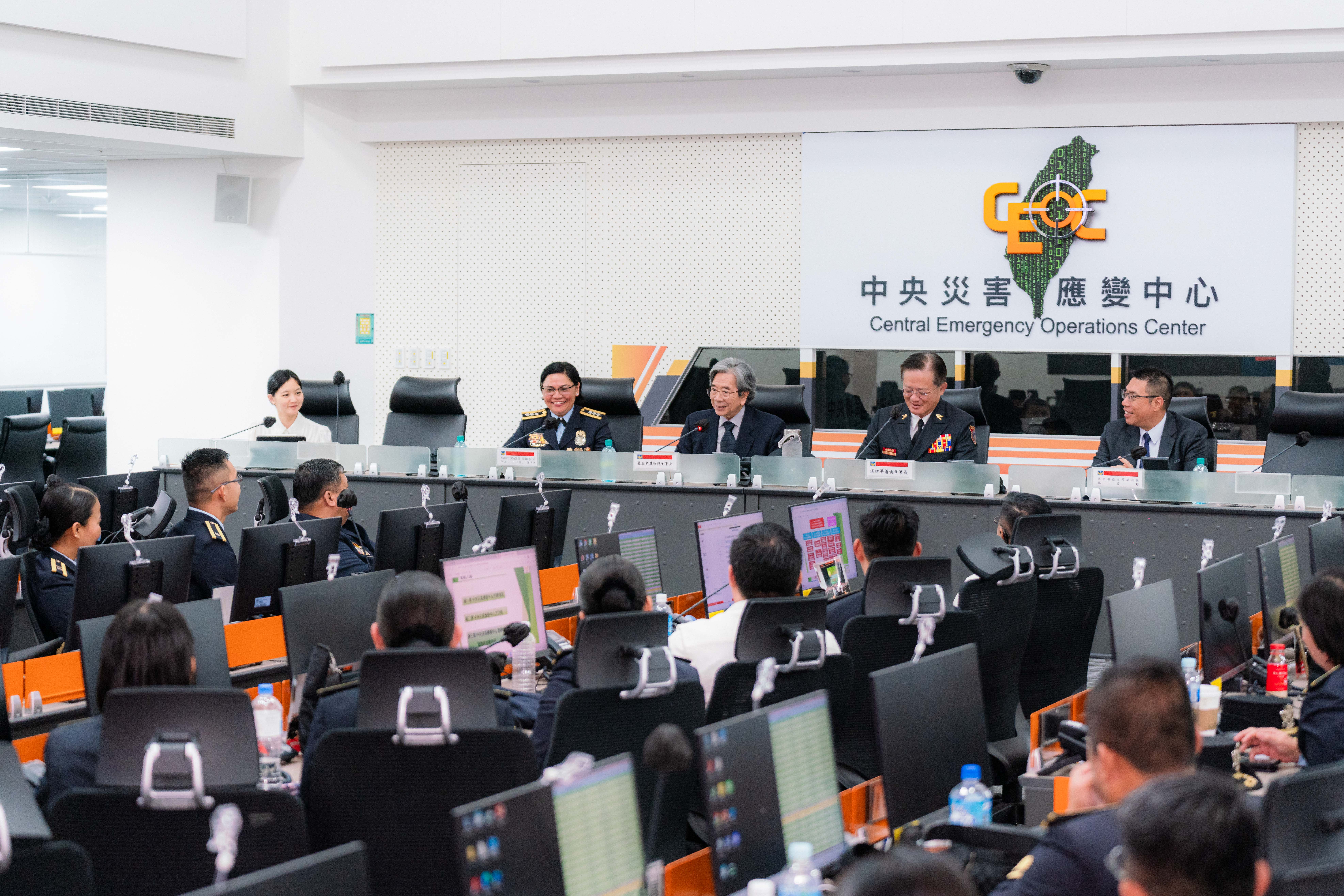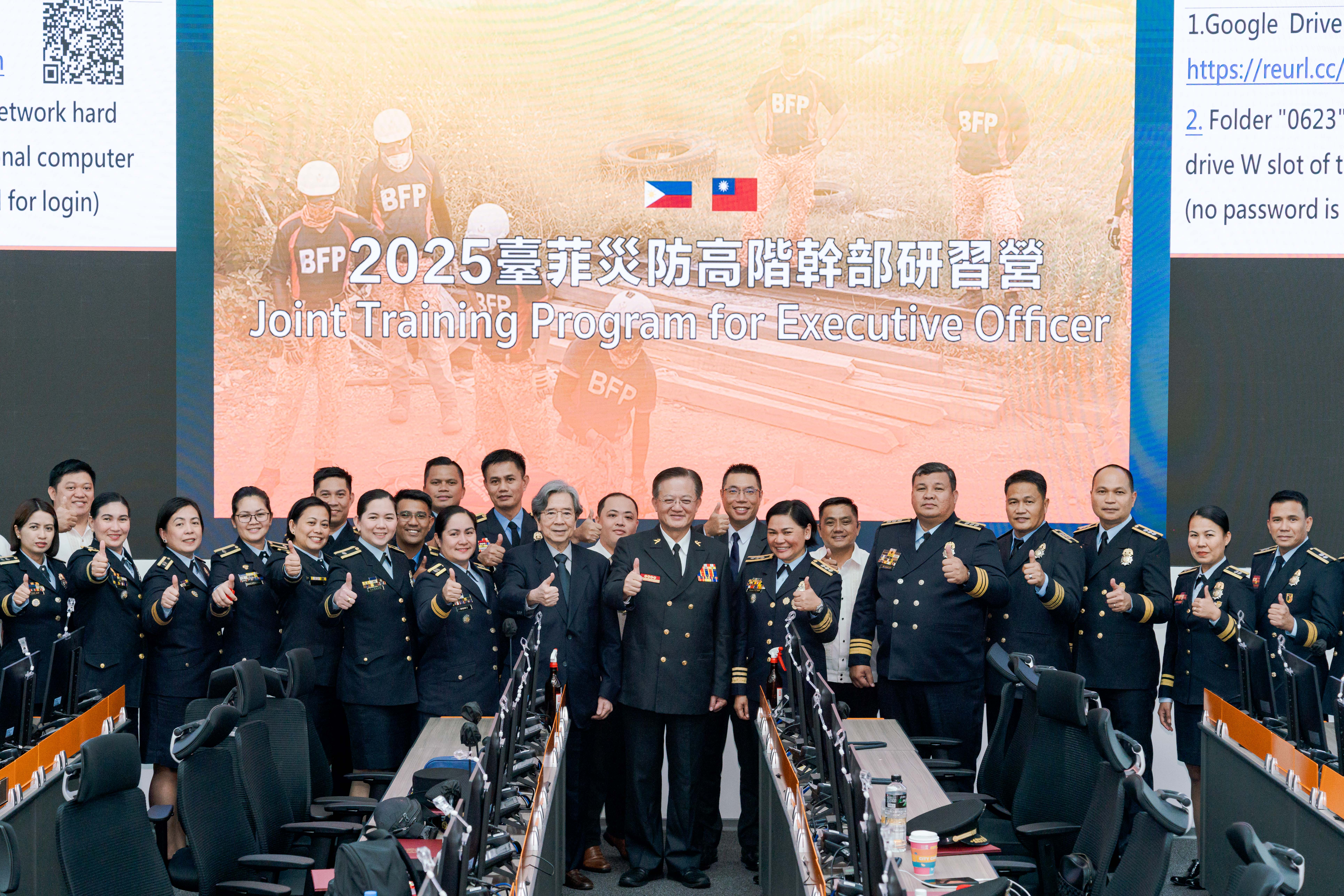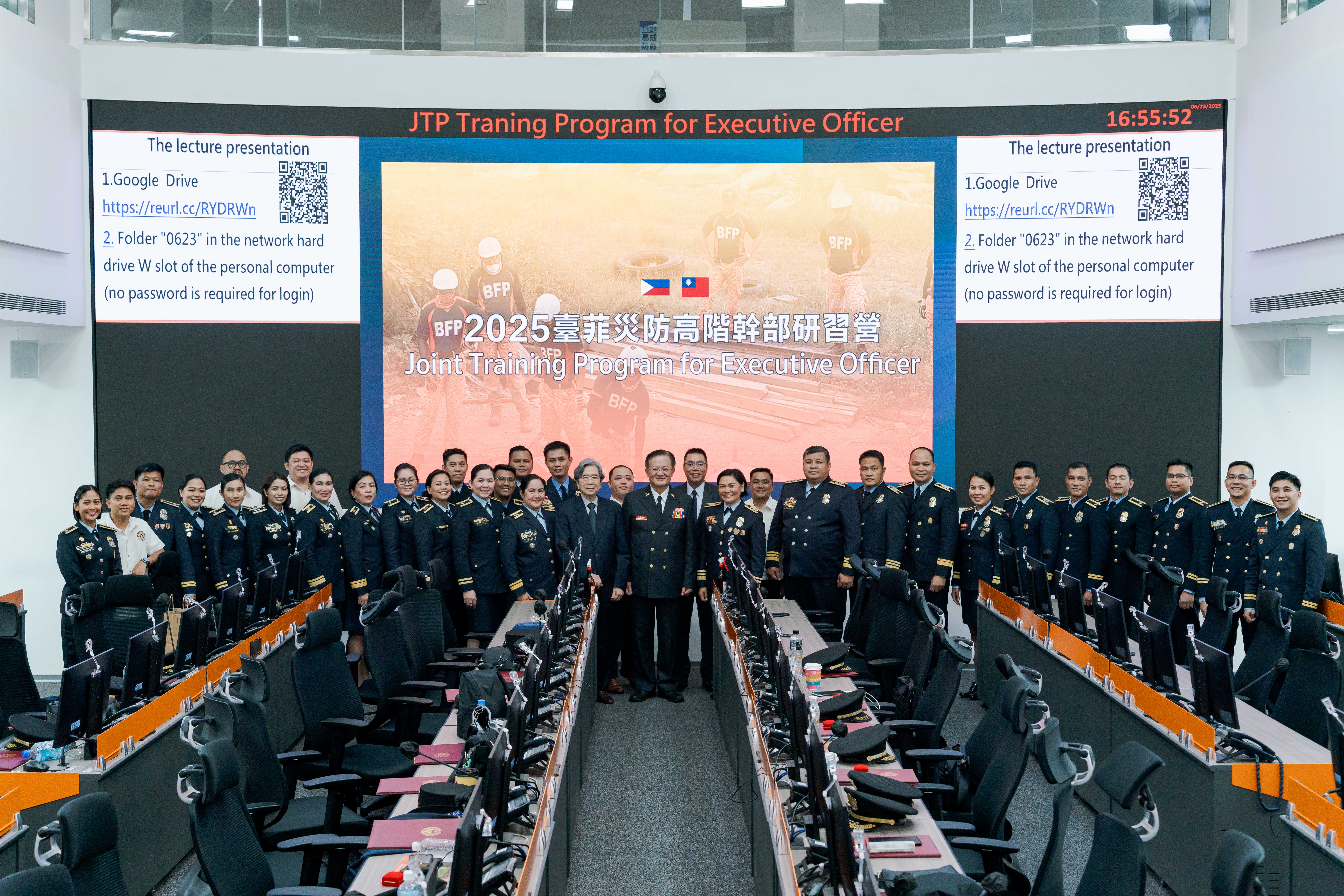Co-hosted by the National Fire Agency (NFA) under the Ministry of the Interior and the Taiwan-Asia Exchange Foundation (TAEF), the closing ceremony of the “Taiwan–Philippines Joint Training Program for Executive Officers (JTP)” was held this afternoon (June 23) at the Central Emergency Operations Center headquarters in Taipei. Senior officers from the Philippines convened in Taipei to mark the successful conclusion of the seven-day professional training and exchange program.

The closing ceremony featured remarks from distinguished guests, including Deputy Director General Johnny Hung-Hsun Lin from the Ministry of the Foreign Affairs, Director-General Huan-Chang Hsiao of the National Fire Agency, Chairman Hsin-Huang Michael Hsiao from TAEF, and Senior Superintendent Joanne Enriquez-Vallejo, Officer-in-Charge of the Training Service at the Philippine Bureau of Fire Protection.
Director-General Hsiao Huan-Chang stated “Taiwan, located at the crossroads of the Asia-Pacific, faces complex disaster risks and has developed strong response capabilities, especially for chemical and industrial incidents,” said Director-General Hsiao. “We are eager to share our experience with global partners to strengthen disaster resilience together.” The training covered fire scene management, disaster command, TECC medical response, and Taiwan’s disaster prevention system. It also included exchanges with Japan’s Tokyo Fire Department and participation in the NFA’s 30th anniversary events. “Cross-border exchanges like these support better planning and decision-making,” he added. Since 2019, 212 Filipino officers have trained in Taiwan. In September, a special rescue team will join Taiwan’s “921 National Disaster Prevention Day” drill. Hsiao also noted that this is the first time a Philippine Civil Defense officer has participated, marking a new milestone.
Deputy Director General Johnny Hung-Hsun Lin highlighted the significance of Taiwan’s New Southbound Policy, launched in 2016, in fostering close cooperation with Southeast Asian partners, particularly the Philippines. “Taiwan and the Philippines are close neighbors and natural partners in disaster management,” Lin stated, emphasizing their shared vulnerability to typhoons and earthquakes and the importance of resilience through solidarity. He cited the 2021 Taiwan– Philippines Disaster Prevention Cooperation MOU as a milestone, noting that nearly 180 Filipino officials have joined capacity-building programs in Taiwan since its signing.Looking ahead, he expressed optimism for deeper collaboration: “We hope to renew and further institutionalize the MOU, and gradually extend from disaster prevention to broader civil defense—particularly in times of significant geopolitical change.”
Chairman Hsin-Huang Michael Hsiao began his remarks by acknowledging the gender diversity of the delegation, noting that “one-third of the participants are women, which represents the people power of the Philippines.” He highlighted the strategic significance of the program, especially following President Lai Ching-te’s recent visit to the National Fire Agency Training Center in Nantou, where it was officially upgraded as an Indo-Pacific Disaster Prevention Base. By hosting 32 officers from the Bureau of Fire Protection of the Philippines, Dr. Hsiao said the program “aims to deepen cooperation between Taiwan and New Southbound partner countries in the field of fire and rescue,” adding that “with Taiwan’s advanced technology and disaster relief experience, we strive to enhance the Philippines’ capabilities.” He emphasized that the program “not only continues the fruitful cooperation between Taiwan and the Philippines, but also deepens it,” and concluded that such international exchange embodies “not only a concrete practice of the New Southbound Policy+ but also the best example of Public-Private-People-Partnership (PPPP).”
Senior Superintendent Joanne Enriquez-Vallejo described the experience as “not only educational, but truly transformational.” Reflecting on the immersive nature of the program, she noted, “It was an extraordinary opportunity” The delegation gained valuable knowledge on disaster management, and firsthand exposure to Taiwan’s disaster preparedness efforts. “It was inspiring to learn from Taiwan’s Kapan Department. The training showcased Taiwan’s great love for its firefighters and its unwavering solidarity with its people,” she said. The team praised Taiwan’s “state-of-the-art” disaster response systems and added that “our transportation and accommodation were exceptionally thoughtful, demonstrating Taiwan’s professionalism and the strength of cross-strait collaboration.” Looking ahead, the delegation expressed hopes to bring enhanced safety awareness and resilience back to the Philippines. “Marami salamat po—thank you very much,” they concluded with gratitude.
At the final moments of the ceremony, the Philippine delegation expressed their heartfelt gratitude by presenting a video montage highlighting their experiences during the training program at the Training Center, including key moments from their hands-on exercises and classroom sessions. This touching gesture was followed by an award ceremony and the exchange of tokens, symbolizing the friendship and deepening partnership between Taiwan and the Philippines.

About the JTP Program and Its Policy Context
The Taiwan–Philippines Joint Force Training Program for Executive Officers (JTP) serves as a high-level platform for bilateral cooperation in disaster response and is closely aligned with the “Resilience Corridor” under Taiwan’s New Southbound Policy Plus (NSP+), led by the Taiwan-Asia Exchange Foundation (TAEF). NSP+ features six strategic corridors: three government-led (Digital Technology, Public Health, and Disaster Resilience) and three driven by civil society (Think Tanks, NGOs, and Youth). The Resilience Corridor focuses on early warning, response coordination, and the application of emerging technologies like drones and unmanned vehicles to strengthen regional disaster preparedness. Since 2023, TAEF and the National Fire Agency have co-organized multiple international training programs—including “The 2023 Japan-Taiwan-Philippines Training Program for Executive Officers,” “The 2023 Taiwan-Vietnam High-Tech Disaster Relief and Firefighting Training Camp,” and “The 2024 Taiwan-Philippines Training Program for Special Rescue Teams”—to build frontline capacity in NSP partner countries. TAEF also collaborates with its Asia Resilience Consortium (AEC) partners, Taiwan Disaster Prevention Industry Association, and Messe Frankfurt, to host its annual Asia Disaster Prevention. This coming September, TAEF will continue to advance this agenda by launching a new round of the Taiwan–Philippines Special Rescue Training Program and a new training camp in partnership with Vietnam. These initiatives reinforce Taiwan’s leadership in Indo-Pacific disaster diplomacy and its commitment to building a resilient, people-centered regional community.
